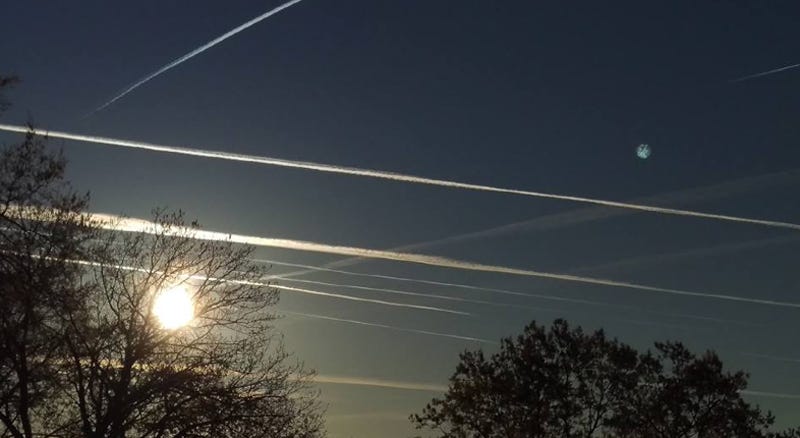Bill would ban geoengineering sky stripes as TN ‘risk to health’
Senate votes to prohibit U.S. from longstanding secretive program using coal fly ash dumped aloft to dim sun in war over 'climate change'


A longstanding bid by U.S. military and other elites to control weather in open violation of the U.S. clean air act is targeted in a bill passed by the Tennessee senate.
By David Tulis / Copperhead Radio Network
The program is under the veil of secrecy, but its work is long in evidence in the skies over the U.S., as it was Sunday over Hamilton County, Tenn.
The official pollution consists of recycled toxic coal fly ash purchased by the millions of tons from utility companies, and dispersed to shift wind, rain, storm and dry weather patterns, accelerating what is said to be a growing global warming crisis.
Dr. Marvin Herndon, a San Diego scientist, broke the story of the content of the aerial dispersions as coal fly ash, this website among the first to report on his findings. Geoengineering is generally called chemtrailing, a term drawn from a military manual. It is credited with raising global temperatures by trapping heat under cloud cover. Coal fly ash is ideal in that its metal content lets the Navy and other parties make the skies conductive in energy transmission.
“It is documented that the federal government or other entities acting on the federal government's behalf or at the federal government's request may conduct geoengineering experiments by intentionally dispersing chemicals into the atmosphere, and those activities may occur within the State of Tennessee,” says the amended SB 2691 and HB 2063 by Rep. Monty Fritts of Kingston and Sen. Steve Southerland of Morristown, both Republicans.
The one-page bill says the risk to human health and environmental welfare from “broad scale geoengineering is currently not well understood” and that dumping materials in the skies over the state’s 41,227 square miles of land and 906 square miles of waters in the state is illegal.
“The intentional injection, release, or dispersion, by any means, of chemicals, chemical compounds, substances, or apparatus within the borders of this state into the atmosphere with the express purpose of affecting temperature, weather, or the intensity of the sunlight is prohibited.”
No penalty provision is provided, and no consideration is given as to how parties in the state — say in tax-funded universities — might be implicated in the program in breach of the act. The measure states that Tennessee Department of Environment and Conservation is responsible for monitoring the pollutants
According to a TV station report, Rep. Fritts cites “widespread documentation” of attempts made to “manage climate change” and manage “solar impact” through chemical compounds, and he is seeking air and water from “unintentional consequences of those efforts.”
The story goes on to say, “There is not currently credible evidence that the U.S. government practices geoengineering; rather the idea is only being debated.” Critical of the measure is Nashville Rep. Justin Jones, who says health concerns are “based on conspiracy theories.”
In June 2023 the U.S. government published a report on solar radiation management indicating that sky striping and geoengineering are new ideas worth studying.
“Academia, philanthropy, and the private sector have examined preliminary applications of climate intervention techniques, such as stratospheric aerosol injection and marine cloud brightening (techniques categorized as “solar radiation modification,” hereafter SRM), intended to rapidly limit temperature increase,” says the “Congressionally mandated research plan and an initial research governance framework related to solar radiation modification.” https://www.whitehouse.gov/wp-content/uploads/2023/06/Congressionally-Mandated-Report-on-Solar-Radiation-Modification.pdf
“Alongside the potential benefits of such actions, serious concerns have been raised about the potential outcomes of SRM. These unknowns, and the ever-evolving understanding of complex Earth systems, provide a compelling case for research to better understand both the potential benefits and risks.”





